Seasonal AC maintenance is essential for ensuring your air conditioning system remains in top condition, preventing unexpected repairs and disruptions. As temperatures fluctuate, your HVAC system experiences different stresses, which can lead to wear and tear. Addressing these issues proactively with a comprehensive maintenance guide can significantly extend the lifespan of your unit, enhance its efficiency, and improve indoor air quality. Understanding the intricacies of AC maintenance, from the compressor to the evaporator coil, is vital for any homeowner or business owner looking to maintain a comfortable environment without the hassle of sudden breakdowns.
Table of Contents
ToggleImportance of Regular HVAC Maintenance
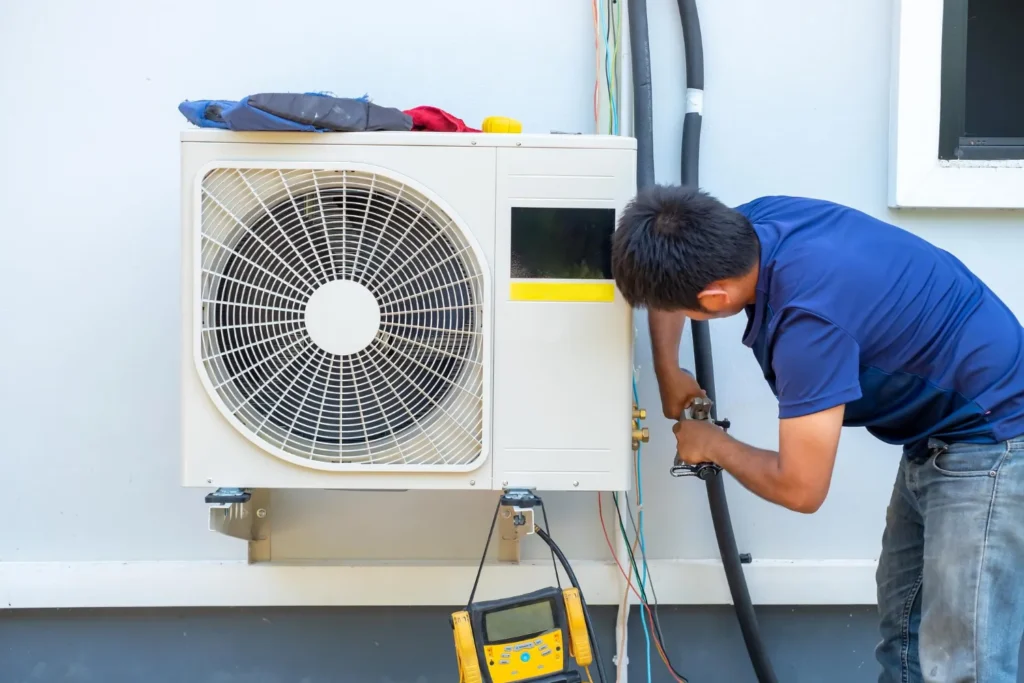
Regular HVAC maintenance of your air conditioning system is crucial for several reasons. It enhances the efficiency of your unit, ensuring that it uses energy optimally and keeps your energy bills low. Regular check-ups can identify issues such as refrigerant leaks or problems with the HVAC system compressor, which are less costly to address early on. Additionally, maintenance involves cleaning or replacing air hvac filter and checking the ductwork for blockages, which can significantly impact airflow and cooling efficiency. By keeping your AC system in prime condition, you also ensure that it provides consistent cooling throughout the seasons, keeping your home or business comfortable.
How Preventive Maintenance Can Save Money and Avoid Disruptions
Preventive maintenance is critical to avoiding the unexpected costs and disruptions associated with air conditioner maintenance & repairs. By scheduling regular maintenance sessions, you can ensure that potential issues like condenser problems, inefficient thermostats, or dirty evaporator coils are dealt with before they escalate. This approach not only saves money on repairs but also prevents the likelihood of your air conditioning system breaking down when you need it most, such as during the peak of summer or a heat wave. Additionally, well-maintained systems are more energy-efficient, which translates into lower utility bills and a reduced environmental impact.
How Different AC Systems Vary by Business Type and Location
The type of AC system suitable for a business can vary significantly depending on the nature of the industry and its geographical location. For instance, a high-tonnage HVAC system with a robust zoning system might be necessary for an ample retail space in a warm climate to handle the cooling demands and manage energy efficiency.
In contrast, a smaller boutique in a more relaxed area may require a less extensive system. Understanding the specific needs of your business type and location can help you choose the right AC system, whether it involves a heat pump for areas with mild climates or a VRF/VRV system for larger, more complex buildings. Regular maintenance tailored to the specific type of system and its installation environment is crucial for optimal performance and longevity.
This detailed approach to each aspect of your AC system not only prepares you for the maintenance tasks ahead but also empowers you with the knowledge to handle them effectively, ensuring your air conditioning system works efficiently and reliably, season after season.
Spring Maintenance Checklist
Spring is a critical time for air conditioning maintenance as it precedes the high-demand months of summer. A thorough spring maintenance checklist should include several critical tasks:
Cleaning and Replacing Filters
This simple step is vital for maintaining airflow and efficiency. Dirty filters restrict airflow, forcing the system to work harder, which can lead to increased energy costs and strain on the air handler.
Inspecting and Cleaning Ductwork: Ensure that the ductwork is free from debris and leaks. Leaky ducts can significantly decrease system efficiency by losing cooled air before it reaches its intended destination.
Checking Refrigerant Levels
Proper refrigerant levels are crucial for efficient operation. A refrigerant leak can cause your system to underperform and can lead to damage to the compressor due to overheating.
Inspecting Electrical Connections and Controls:
Ensure that all electrical connections are tight and that controls are functioning correctly. This includes checking the thermostat, which should be calibrated correctly to ensure accurate temperature settings and operation.
Checking and Sealing Ducts for Efficient Operation
The ductwork is often overlooked but is essential for the efficient operation of your air conditioning system. Leaks or blockages in the ducts can lead to significant energy losses. During spring maintenance, inspect all ductwork for signs of damage, such as holes or disconnected segments, and use duct sealant or metal-backed tape to repair any leaks. Proper insulation of ducts, especially in unconditioned spaces, can further enhance the efficiency of the air conditioning system by preventing energy loss.
Season Preparing Your AC for High-Demand Months
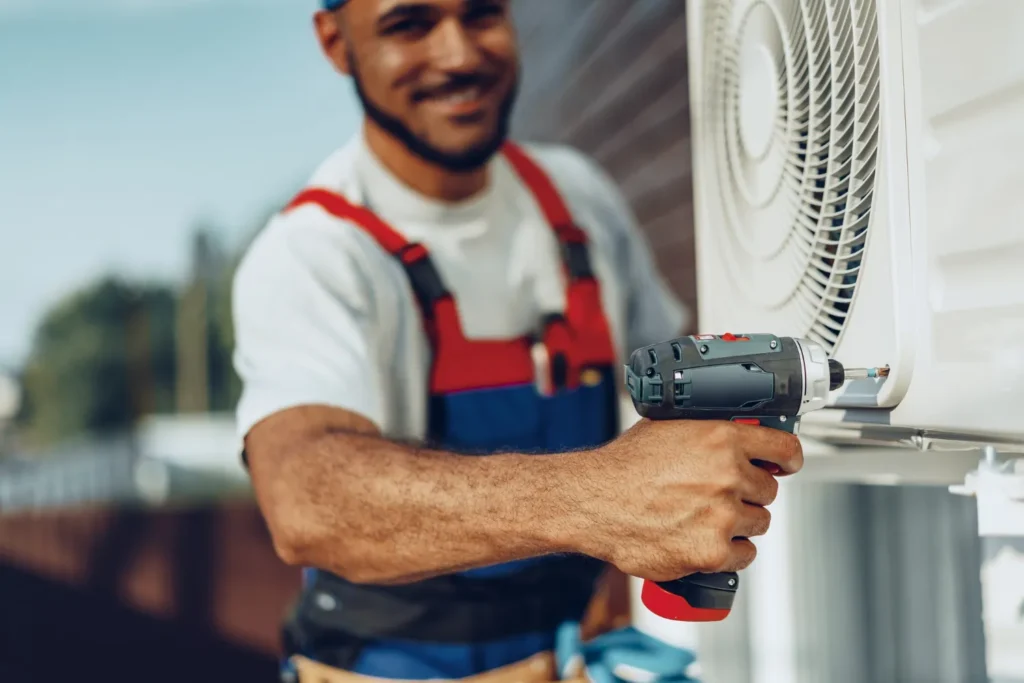
As summer approaches, preparing your AC for high-demand months is crucial to ensure it operates smoothly when you need it most. This preparation includes:
- Calibrating the Thermostat: Ensure your thermostat is accurately reading and regulating the temperature. Consider upgrading to a smart thermostat for better energy management and convenience.
- Servicing the Compressor and Condenser Unit: The outdoor unit should be inspected and cleaned to ensure it is free from debris and obstructions that can impair its efficiency. Checking the compressor for signs of wear or overheating is also crucial, as it is the heart of the system.
- Testing Airflow and Cooling Efficiency: After all other components have been checked and serviced, test the system to ensure it is cooling effectively and evenly throughout the space. Adjustments may be needed to ensure optimal performance.
Summer Preparedness for Continuous Operation
During the summer months, your AC system will likely run more frequently. Preparing for continuous operation involves several steps to ensure reliability and efficiency:
- Monitoring Performance: Keep a close eye on your AC’s performance. Any drop in efficiency or effectiveness could indicate a problem that needs immediate attention.
- Implementing Load Balancing: For larger systems, especially in commercial settings, balancing the load on different units can prevent overuse and prolong the life of your equipment.
- Setting Up Regular Professional Inspections: Arrange for a professional HVAC technician to inspect your system periodically during the summer months. This can help catch issues before they become severe and ensure your system is running as efficiently as possible.
Monitoring Your AC’s Performance During Peak Usage
During the summer, when AC systems are under the highest load, it’s essential to monitor their performance closely. Regular checks should include:
- Observing Cooling Patterns: Uneven cooling or longer run times can indicate issues such as low refrigerant levels, poor airflow, or failing components like the compressor or evaporator coil.
- Listening for Unusual Noises: Sounds such as rattling, buzzing, or hissing can signal loose parts, electrical issues, or a refrigerant leak.
- Monitoring Energy Bills: An unexpected increase in your energy bills could be a sign that your AC unit is losing efficiency and may require maintenance or repairs to restore its function.
Tips for Managing Humidity and Comfort in Various Settings
Managing indoor humidity and maintaining comfort is crucial, particularly in commercial settings where comfort can impact productivity and customer satisfaction. Techniques include:
- Using Dehumidifiers: In areas with high humidity, integrating dehumidifiers with your AC system can help maintain comfortable humidity levels without overloading the AC system.
- Optimizing Air Circulation: Enhance comfort by ensuring that air is evenly distributed throughout the space. This might involve adjusting fan speeds or redirecting airflow through ductwork adjustments.
- Maintaining Optimal Thermostat Settings: Avoid setting the thermostat too low in an attempt to cool more quickly. This does not speed up cooling but may lead to excessive cooling and increased energy costs.
Autumn Tasks to Extend Air Conditioner Lifespan
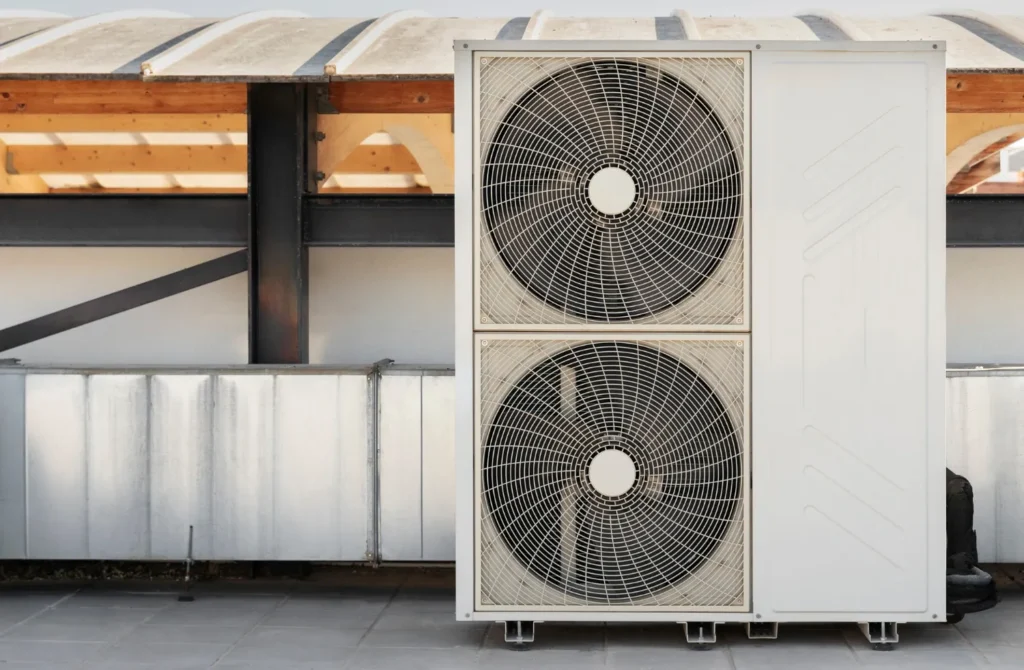
As the demand for air conditioning systems decreases with the arrival of cooler autumn temperatures, it’s an ideal time to perform maintenance tasks that can extend the lifespan of your unit:
- Cleaning the System: Remove any debris that has gathered around the condenser unit. Clean the evaporator coil and condenser coil to ensure they are free from dust and dirt buildup.
- Checking for Wear and Tear: Inspect belts and motors for any signs of wear. Replace any worn components to prevent future failures during peak usage times.
- Preparing for Inactivity: If certain parts of your HVAC system will not be used during the colder months, consider covering the outdoor unit and securing it against winter weather conditions.
Assessing the Season’s Wear and Tear
Post-summer evaluations are crucial to identify the wear and tear from the peak usage season:
- Reviewing System Performance: Look back at how the system performed during the summer. Were there any recurrent issues? Did certain areas not cool sufficiently? These reflections can guide your maintenance decisions.
- Inspecting for Physical Damage: Check the entire system for any signs of physical damage, including the outdoor units that are exposed to weather and environmental factors.
- Evaluating System Efficiency: Use this time to assess if your system maintained its energy efficiency throughout the season or if there were fluctuations that need addressing.
Preparing for Cooler Months: Settings and Adjustments
To ensure your AC system is ready for the cooler months, make specific adjustments to the settings:
- Adjusting the Thermostat: As temperatures drop, adjust your thermostat settings to maintain comfort without overworking the system.
- Checking Heating Components: For HVAC systems with both heating and cooling, ensure the heating components are also in good working order, as they will soon be in use.
- Sealing Leaks: Ensure that windows, doors, and ductwork are correctly sealed to prevent cold drafts and maintain heating efficiency.
Winterizing Your Air Conditioner System
Winterizing your air conditioning system is a crucial measure to protect it during the colder months when it’s not in frequent use. One of the essential steps is covering the outdoor unit. A breathable, waterproof cover is ideal for shielding the condenser unit from winter debris and harsh weather conditions. This cover prevents the accumulation of snow and ice, which can damage the internal components.
Another essential task is draining any standing water from the HVAC system, including pipes and drainage areas. This step is vital to prevent water from freezing within the system, which can lead to damage and costly repairs. Ensuring all water is removed before temperatures drop below freezing can save a lot of trouble and expense in the long run.
Additionally, inspecting and sealing any openings in your system is crucial. This involves checking for any gaps or cracks that might allow cold air to penetrate. Sealing these openings not only protects the air conditioning system but also improves the efficiency of your heating system throughout the winter. Effective sealing helps maintain a consistent indoor temperature. It reduces the strain on your heating system, leading to better energy efficiency and lower utility bills.
Protecting Outdoor Units from Extreme Weather
Outdoor units of air conditioning systems are particularly susceptible to weather-related damage, so implementing effective protection strategies is crucial. One key strategy is elevating the units above the typical snowfall level in areas prone to heavy snow. This elevation prevents snow from accumulating around the units, which can block airflow and reduce efficiency.
Regularly clearing snow and ice from around these units is also essential. This routine maintenance prevents the buildup of ice and snow, which can lead to mechanical failures or inefficiencies in the system’s operation. It’s important to gently remove ice to avoid causing damage to the exterior of the unit.
Additionally, after any significant weather events, it is advisable to inspect outdoor units for any damage that may have been caused by wind, ice, or debris. Checking for such damage is critical because timely identification and repair can prevent more severe issues down the line, ensuring the longevity and proper functioning of the air conditioning system.
The Importance of Insulation and Proper Storage
Proper insulation and storage of your AC system components are crucial for maintaining efficiency and preventing damage during the off-season. Insulating ducts is essential, especially for ductwork that runs through unheated spaces. Proper insulation prevents heat loss, which can significantly reduce the workload on your heating system, enhancing its efficiency and prolonging its lifespan.
For those who use portable or window AC units, proper storage during the winter months is equally essential. It is advisable to thoroughly clean these units and ensure they are scorched before storing them. Once cleaned and dried, covering them and storing them in a dry, cool place helps prevent any potential damage from moisture and cold temperatures, ensuring that they remain in good working condition for the next season. This careful attention to maintenance and storage helps to extend the life of your air conditioning units and maintain their efficiency.
Energy Efficiency Tips Across Seasons
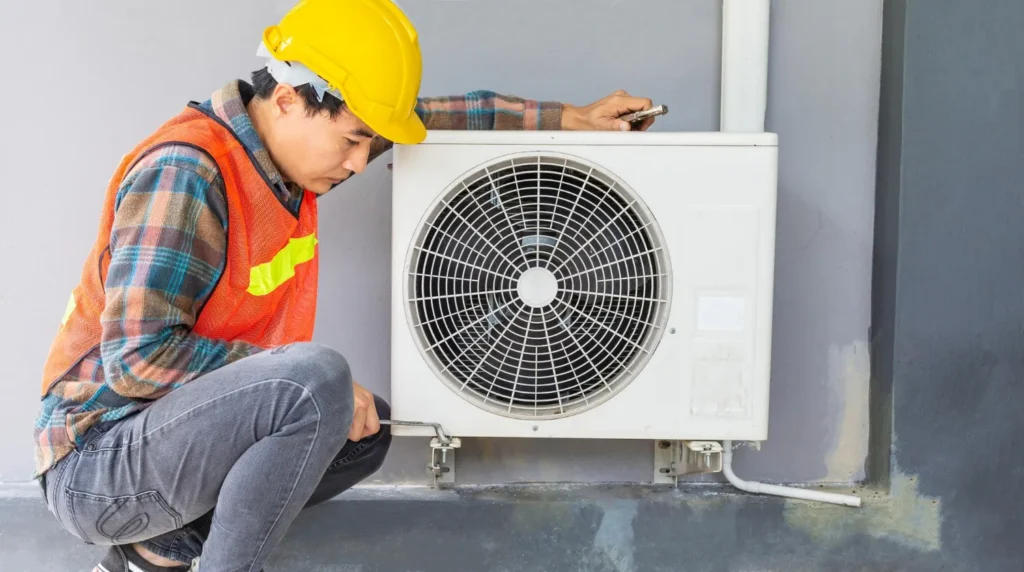
Maintenance checklist for energy efficiency is crucial throughout the year, not just during the peak usage periods. Here are some strategies to ensure your AC system runs efficiently:
Regularly replacing or cleaning filters is fundamental. A clean filter allows your HVAC system to run more efficiently by improving airflow and reducing energy consumption. Another effective strategy is using energy-efficient settings on thermostats. Smart thermostats can significantly reduce energy usage by adjusting the temperature based on your schedule and preferences. Additionally, consider upgrading to energy-efficient models if your HVAC system is older. Upgrading to a more energy-efficient model can save you money on energy bills in the long run.
Optimizing Your AC Settings for Energy Savings
Optimizing your AC settings is another effective way to enhance energy efficiency. Setting appropriate temperature ranges is crucial. Keep your thermostat set at a comfortable yet economical temperature. Typically, setting your thermostat to 78°F (26°C) in summer and 68°F (20°C) in winter can provide comfort while reducing energy costs. Using programmable thermostats allows you to set your AC to run less when you are not home or during hours when the demand for cooling is lower. This saves energy and reduces wear on your system.
Smart Thermostats and Automated Systems for Commercial Users
For business owners, implementing smart thermostats and automated systems can lead to significant improvements in HVAC efficiency. Automated climate control systems adjust the cooling and heating based on the number of people in the space and the time of day. This can optimize energy use and reduce costs. Additionally, intelligent systems allow you to monitor and control your HVAC system remotely. This capability makes it easier to maintain optimal settings and quickly address any issues that arise, ensuring that the system remains efficient and reliable throughout the year. These strategic upgrades can save you money on energy bills and repair costs while maintaining a comfortable environment for your home or business.
Professional Seasonal Air Conditioning Maintenance vs DIY: What You Need to Know
Maintaining your air conditioning system effectively requires understanding the balance between professional maintenance and do-it-yourself (DIY) efforts. HVAC systems consist of complex mechanical and electrical components such as compressors, condensers, and thermostats. Due to their complexity and safety concerns—especially when dealing with electrical components or refrigerant handling—specific maintenance tasks are best left to professionals. This ensures safety and compliance with regulations.
Even if you undertake some maintenance tasks yourself, it is crucial to have your system professionally inspected at least once a year. These inspections help identify and address potential issues early, preventing costly repairs and extending the lifespan of your unit.
When to Call a Professional for AC Maintenance
You should call a professional HVAC technician under the following circumstances:
- Refrigerant Issues: Since handling refrigerant requires specific certification due to the hazardous chemicals involved, any related issues, such as refills or leaks, necessitate professional intervention.
- Electrical Problems: Issues involving electrical components need to be managed by qualified technicians to avoid risks like electrocution or further system damage.
- Significant Performance Drop: If your AC system starts to underperform or uses more energy without an apparent reason, a professional can diagnose and fix problems that are not evident to the untrained eye.
Safe Maintenance Practices for Business Owners and Managers
For business owners and managers, ensuring the safety and efficiency of AC systems is not just about performance but also about the safety and comfort of employees and customers. It is essential to:
- Educate Your Team: Maintenance staff should be trained on basic tasks such as changing filters and system resets and should know when to escalate issues to a professional.
- Implement a Regular Maintenance Schedule: Regularly scheduled maintenance tasks like cleaning ducts and changing filters can prevent minor issues from becoming major problems.
- Ensure Compliance: Always make sure that maintenance and repairs comply with local regulations and safety standards, especially when managing commercial HVAC systems.
Adhering to these guidelines will help maintain the efficiency, safety, and longevity of your air conditioning system.
The Impact of Maintenance on Indoor Air Quality
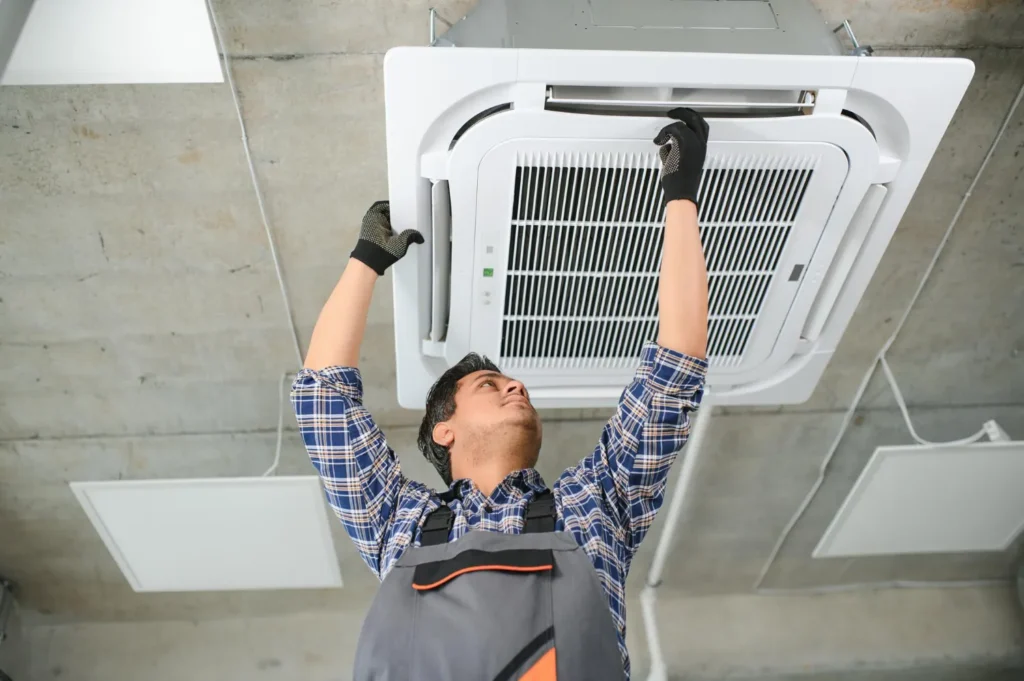
Regular maintenance of your AC system significantly impacts indoor air quality, which is crucial for both homes and businesses. Maintaining clean air filter is essential as it prevents pollutants such as dust, pollen, and other allergens from circulating in the air. Additionally, keeping the interior components of your AC system clean helps avoid the buildup of mold and bacteria, which can deteriorate air quality.
Enhanced indoor air quality not only contributes to a healthier environment but also reduces the likelihood of respiratory issues and improves overall comfort. By understanding when to perform maintenance tasks yourself and when to call professionals, you can ensure that your AC system operates efficiently, safely, and effectively. This diligent approach to maintenance provides optimal comfort and air quality while helping avoid unexpected repairs and costs, thereby extending the life of your equipment and promoting a more sustainable, health-conscious operation.
Health Benefits of a Well-Maintained AC System
A well-maintained AC system not only cools spaces efficiently but also significantly enhances indoor air quality, making it particularly beneficial in environments like healthcare facilities and schools. Clean, pollutant-free air reduces the risk of respiratory conditions and allergic reactions, serving as a preventive measure for health care in indoor environments.
Best Practices for Maintaining Indoor Air Quality
Effective maintenance of indoor air quality involves a combination of regular system upkeep and attentive management of the indoor environment. Regular replacement or cleaning of air filters prevents the accumulation of airborne particles. Furthermore, keeping components such as ductwork and evaporator coils clean inhibits the growth of harmful mold and bacteria. Scheduled professional inspections are crucial as they can identify issues that may take time to become evident, ensuring the system remains clean and efficient.
How Timely Repairs Have Benefited Various Businesses
Timely repairs are crucial for minimizing downtime and related costs in a business environment. One restaurant owner discovered a refrigerant leak early due to regular system check-ups. The quick repair not only saved the compressor—a costly component—from failure but also avoided a potential shutdown during peak hours, which would have led to significant revenue loss. In another instance, a school was able to continue operations without interruption during a heatwave because its proactive maintenance plan included pre-summer inspections and repairs, ensuring the system operated efficiently even under extreme conditions.
Conclusion – Seasonal AC Maintenance
In conclusion, regular and seasonal AC maintenance is a critical investment in your property’s operational efficiency, comfort, and safety. Planning your maintenance activities can help ensure that your system is always running at optimal performance and is prepared to handle the seasonal HVAC maintenance demands placed upon it. Implementing a structured maintenance schedule that includes both professional services and routine DIY tasks can maximize your system’s lifespan, enhance indoor air quality, and ensure energy efficiency. By staying proactive, you not only save on costs in the long run but also contribute to a healthier and more comfortable environment for everyone who uses your space.
FAQs About Seasonal AC Maintenance
What are the signs that my AC system’s ductwork needs cleaning or repair?
If you notice reduced airflow, increased energy bills, or dust buildup around your vents, these could be signs that your ductwork needs attention. Regular duct inspection and cleaning can prevent these issues and help maintain the efficiency and health of your HVAC system.
How often should refrigerant levels be checked in my AC system?
It’s recommended to check refrigerant levels at least once a year, typically during a routine maintenance inspection. If your AC is not cooling correctly or if it seems to be running longer than usual, these might be signs of low refrigerant levels that need professional adjustment.
Can a dirty evaporator coil affect my health?
Yes, a dirty evaporator coil can lead to poor indoor air quality by circulating mold, bacteria, and other contaminants in your air. This can trigger allergy symptoms, respiratory issues, and other health problems. Regular cleaning of the evaporator coil is essential for maintaining good indoor air quality.
What is the best way to handle AC maintenance in a multi-unit commercial building?
A: For multi-unit commercial buildings, it is essential to have a tailored maintenance strategy that addresses the specific needs of each unit while ensuring overall system efficiency. This might include individualized schedules for filter changes, duct inspections, and system checks to prevent disruptions and optimize performance across all units.
How can I improve the energy efficiency of my aging AC system without replacing it?
A: Improving the energy efficiency of an older AC system can be achieved by ensuring it is well-maintained, such as through regular cleaning of components and ductwork, timely repairs, and thermostat upgrades. Installing additional features like zoning systems or programmable thermostats can also help manage energy usage more effectively without the need for a total replacement.
